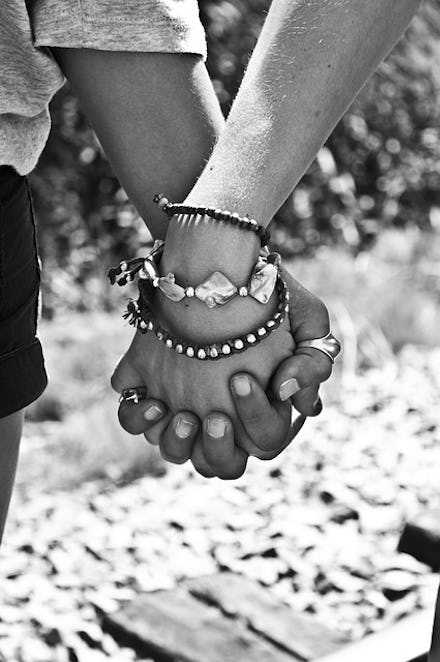Will You Be My Internet Friend?

It was in college that I finally learned to make friends.
I am bipolar; I was in a program full of other people who identified as writers, a group with a common predilection towards mental illnesses. While making friends was easier amongst other writers, and is easy for me now, being bipolar sometimes makes keeping these friends hard. As Elizabeth Wurtzel once wrote of depression, “The fog is like a cage without a key." Being bipolar means not only these soul-destroying downs but also bouts of mania. Bipolar behavior affects everyone differently, but manic episodes can be erratic. I have put myself and other people through scary or hurtful situations while not realizing anything was wrong.
My own difficulty in keeping confidantes explains why I loved Ann Friedman’s piece on courting friends. Friedman discusses the importance of pursuing platonic friendships the way we do romantic relationships. It requires work and persistence to build any sort of relationship. That’s as true for me as anyone, except my friendships must also survive periods of mania, hardly the same as asking a friend to stick by you on a bad day.
Of course, there's a big difference between untreated and treated mental illness, one I can attest to. For years, I didn’t seek help. I didn’t know how to, or I didn’t want to. It felt like admitting that I was broken. I could romanticize being bipolar as a writer — it was common, it was creative. I feared that if I stabilized my moods I would not have the desire to write anymore, and because writing was my therapy, that terrified me. Add in the stigma of being bipolar and the best solution seemed to be to just deal with it.
It didn't work. When I am in a manic phase, I am not the best version of myself, and the worse version has damaged a lot of relationships. Some people I lied to; others I took for granted until they were fed up with me. Some managed to stick by me, offering support despite their frustration.
Perhaps my own struggles explain why I find the best friendships on television, where everything looks so easy. I watch Community and admire the companionship of Troy and Abed. I love the friendship of Leslie Knope and Ann Perkins from Parks and Recreation. I want to have a friendship like theirs —who wouldn’t? — but I am not useful enough to be Ann, or nice enough to be Leslie. I would never be able to compliment people and show my appreciation in the effortless way that Leslie can.
To be honest, my friendships look more like the muddled narcissistic pursuits penned by Lena Dunham in Girls. The criticisms of the show as overwhelmingly white and hetero-normative make me ashamed to identify with Hannah Horvath, and yet I do. Mix together the neurotic anxiety of Shoshanna Sharpiro with the self-absorbed nature of Hannah and you have something that resembles what it is like to know me. It's comforting to see a group of individuals as lost and terrified by life as I am.
Of course, I may be reading into the characters what I want to see, but that is what television is for.
Still, while Hannah Horvath shows me who I am, and Leslie and Ann or Troy and Abed teach me what friendship is, they live in the world of ficiton, and I don't. I can't cast a friend in a supporting role and be done with it. I know now that friendship requires the same work you put into a romantic relationship; I endeavor to be successful at both. At the same time, I can’t fix the manic episodes. Instead, I must work on using coping mechanisms to limit the behavior that is hurtful to others and myself. For that, a different form of mediated interaction has been the biggest help for me: the internet.
As Sylvia Plath said, "I like people too much or not at all."
I know that I enthusiastically pursue new friends in the same nonsensical way that ravens stockpile shiny objects. I am unsure what to do with people except tuck them into my nest and admire them at my convenience. It's not for a lack of trying, or wanting, to be social.
Luckily for me, social media lets me have the kinds of interactions that I feel I can manage. Take Twitter, for instance. I can participate enthusiastically in a conversation and then walk away precisely when I get overwhelmed and no longer feel like engaging. I can make people who insist on being willfully obtuse go away with the click on a block button — even though I will inevitably unblock them to peek at their timeline later, if only to find something to affirm my perception of their personality. (Come on, like you never do that.)
I see other people make a divide between their internet friends and their real-life friends as though there was a hierarchy. I don’t know why. People whose real names I do not even know who have saved my life.
Three years ago, I was vulnerable and depressed, working as a freelance writer and making just enough money to pay my bills. Since I had no money for health care or therapy, I slid into a deep depression. I became agoraphobic. Seeing people in real life became almost unbearable. Early in the morning, when I couldn't sleep, I turned to Depression Chat Rooms, where I met other people who were in different stages of depression. It was an amazingly supportive community, and support from its members made all the difference to me.
As I write, winter is coming, granting me a reprieve from having to come out of my shell, or leave my house. In the meantime, you can always find me on Twitter or Facebook.